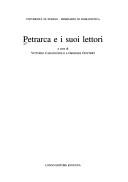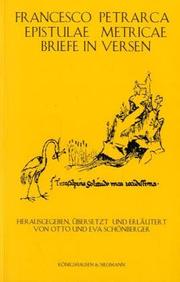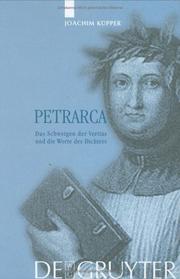| Listing 1 - 10 of 118 | << page >> |
Sort by
|
Book
Year: 2021 Publisher: Milan FrancoAngeli
Abstract | Keywords | Export | Availability | Bookmark
 Loading...
Loading...Choose an application
- Reference Manager
- EndNote
- RefWorks (Direct export to RefWorks)
The volume draws attention to some elements of ambiguity in the Italian Petrarchism of the 16th century, with insights also into the early 17th century. In particular, the book analyses: the debate on some contradictory or at least problematic aspects of Petrarch’s statements on love; the tension between literary artificiality and ostentation of sincerity in love letters; the ambiguity between sacred and profane in the encomiastic field, with special reference to the metaphor of the ‘temple’ in the so-called ‘temples of poems’. The path here proposed offers an idea of Petrarchism as a phenomenon less rigid and stereotyped than usually perceived. Its ambiguities or even contradictions can be subjects of debate, without necessarily taking the path of anti-petrarchism and parodic deformation.

ISBN: 8880632523 Year: 2000 Volume: 18 Publisher: Ravenna Longo editore
Abstract | Keywords | Export | Availability | Bookmark
 Loading...
Loading...Choose an application
- Reference Manager
- EndNote
- RefWorks (Direct export to RefWorks)
Petrarca, Francesco, --- Pétrarque --- Petrarch --- Petracco, Francesco --- Petrarca, Francesco (1304-1374) --- Criticism and interpretation. --- Petrarca, Francesco --- Petrarca, Franciscus, --- Petrarch, --- Petrarch, Francesco, --- Petrarcha, Franciscus, --- Petrark, --- Petrarka, Franchesko, --- Peṭrarḳa, Frants'esḳo, --- Pétrarque, --- Петрарка, Франческо, --- פטררקא, פרנצ׳סקו

ISBN: 3826028864 9783826028861 Year: 2004 Publisher: Würzburg: Königshausen und Neumann,
Abstract | Keywords | Export | Availability | Bookmark
 Loading...
Loading...Choose an application
- Reference Manager
- EndNote
- RefWorks (Direct export to RefWorks)
Francesco Petrarca (1304-1374) faßte nach der Mitte seines Lebens den Entschluß, seine lateinischen Briefe zu sammeln und herauszugeben. Neben der riesigen Masse der Briefe in Prosa stellte er auch seine Versepisteln zusammen, anmutige und formgewandte Dichtungen, die besonders geeignet sind, Wesen und Kunst Petrarcas kennen zu lernen. Zwar folgt der Dichter in der Form den Horazischen Briefen, doch macht er sich von Beginn an mit großer Selbständigkeit von seinem römischen Vorbild frei, mit dem ihn fast nur die Freude an der Natur und am Wohnen auf dem Lande verbinden. Dafür erleben wir seine ungemeine seelische Erregbarkeit mit, seine Stimmungen, das Verhältnis zu seinen Gönnern, Freunden und Feinden, den Ehrgeiz, seine Liebe zu Laura und den Kampf mit der Leidenschaft, aber auch seine Teilnahme am politischen Leben, die Begeisterung für das alte und neue Rom und für seine Heimat Italien. All dies hat Petrarca mit ganz persönlicher Wärme und Anteilnahme gestaltet und mit hoher Formkraft in den Versepisteln wahre lyrische Kunstwerke geschaffen, die vielfach den Vergleich mit seinen ungleich bekannteren Dichtungen in italienischer Sprache aushalten und den Dichter ungeachtet einiger persönlicher Schwächen als großen Geist und zugleich liebenswürdige Persönlichkeit erscheinen lassen. Die Epistulae Metricae wurden vor hundert Jahren (1904) zum ersten Mal in Deutsche übertragen (in sehr gelungenen Versen); die nun vorgelegte Übersetzung bemüht sich, den Text so genau wie möglich in Prosa wiederzugeben, ohne die poetische Kraft und Anmut aufzugeben, ein Unternehmen, das freilich auch die Grenzen des Übersetzens in voller Deutlichkeit offenbart. Die Herausgeber und Übersetzer Otto Schönberger, geb. 1926 in Dillingen, studierte Klassische Philologie, Germanistik und Philosophie. Er lebt heute in Würzburg. zahlreiche Publikationen bei K&N. Eva Schönberger ist Klass. Philologin, Mitübersetzerin zahlreicher Bücher.
Authors, Italian --- Petrarca, Francesco, --- Pétrarque --- Petrarch --- Petracco, Francesco --- Petrarca, Franciscus, --- Petrarch, --- Petrarch, Francesco, --- Petrarcha, Franciscus, --- Petrark, --- Petrarka, Franchesko, --- Peṭrarḳa, Frants'esḳo, --- Pétrarque, --- Петрарка, Франческо, --- פטררקא, פרנצ׳סקו --- Petrarca, Francesco
Book
ISSN: 01661302 ISBN: 1281939684 9786611939687 9047422880 9789047422884 9789004163225 9004163220 9781281939685 6611939687 Year: 2007 Volume: v. 31 Publisher: Leiden ; Boston : Brill,
Abstract | Keywords | Export | Availability | Bookmark
 Loading...
Loading...Choose an application
- Reference Manager
- EndNote
- RefWorks (Direct export to RefWorks)
This volume addresses one of the most far-reaching aspects of Petrarch research and interpretation: the essential interplay between Petrarch’s texts and their material preparation and reception. The essays look at various facets of the interaction between Petrarchan philology and hermeneutics, working from the premise that in Petrarch’s work philological issues are so authorially driven that we cannot in fact read or interpret him without understanding the relevant philological issues and reapplying them in our critical approach to his works. To read and interpret Petrarch we must come to grips with the fundamentals of Petrarchan philology. This volume aims to show how a Petrarchan hermeneutics must be based on an understanding of Petrarchan philology.
Tekstinterpretatie. --- Petrarca, Francesco, --- Pétrarque --- Petrarch --- Petracco, Francesco --- Petrarca, Francesco (1304-1374) --- Criticism, Textual --- Petrarca, Franciscus, --- Petrarch, --- Petrarch, Francesco, --- Petrarcha, Franciscus, --- Petrark, --- Petrarka, Franchesko, --- Peṭrarḳa, Frants'esḳo, --- Pétrarque, --- Петрарка, Франческо, --- פטררקא, פרנצ׳סקו --- Petrarca, Francesco
Book
ISBN: 9788822266910 8822266919 Year: 2019 Publisher: Firenze Leo S. Olschki
Abstract | Keywords | Export | Availability | Bookmark
 Loading...
Loading...Choose an application
- Reference Manager
- EndNote
- RefWorks (Direct export to RefWorks)
Nel volume si censiscono, editano e commentano paleograficamente un gruppo di 39 attestazioni autografe di Francesco Petrarca, brevi testi che, lasciati sulle carte di guardia anteriori o posteriori dei libri appartenutigli, sono perciò collocati in un luogo periferico ma, anche, significativamente a contatto con il libro stesso. Si tratta di un insieme di ‘tracce’ grafiche che costituisce un complesso per molti versi coerente, segno materiale di un progetto culturale meritevole della nostra attenzione.
Petrarca, Francesco, --- Pétrarque --- Petrarch --- Petracco, Francesco --- Petrarca, Franciscus, --- Petrarch, --- Petrarch, Francesco, --- Petrarcha, Franciscus, --- Petrark, --- Petrarka, Franchesko, --- Peṭrarḳa, Frants'esḳo, --- Pétrarque, --- Петрарка, Франческо, --- פטררקא, פרנצ׳סקו --- Autographs. --- Petrarca, Francesco

ISBN: 3110175576 9786612195464 1282195468 3110201747 Year: 2002 Publisher: De Gruyter, Inc.
Abstract | Keywords | Export | Availability | Bookmark
 Loading...
Loading...Choose an application
- Reference Manager
- EndNote
- RefWorks (Direct export to RefWorks)
Im Mittelpunkt der fünf Essays des Bandes steht die Lyrik Petrarcas. Der erste Essay indes ist dem ""Secretum"" gewidmet, d. h. dem Theologen und dem Philosophen Petrarca. Dies hat programmatischen Charakter: Die hier versammelten Studien versuchen, einen neuen Zugang zum ""Canzoniere"" zu entwickeln, indem sie die Gedichte in den Kontext der Diskurse ihrer Entstehungszeit einordnen. Aufgrund des Spannungsverhältnisses zu den geistigen Strömungen der Epoche ergibt sich gleichwohl der Befund einer zuweilen überraschenden Modernität und auch Aktualität des lyrischen Œuvres des Dichters. - Ausgeh
Italian literature. --- Ottovolante (Group of writers) --- Petrarca, Francesco, --- Petrarca, Francesco --- Pétrarque --- Petrarch --- Petracco, Francesco --- Petrarca, Franciscus, --- Petrarch, --- Petrarch, Francesco, --- Petrarcha, Franciscus, --- Petrark, --- Petrarka, Franchesko, --- Peṭrarḳa, Frants'esḳo, --- Pétrarque, --- Петрарка, Франческо, --- פטררקא, פרנצ׳סקו --- Criticism and interpretation.
Book
Year: 2021 Publisher: Milan FrancoAngeli
Abstract | Keywords | Export | Availability | Bookmark
 Loading...
Loading...Choose an application
- Reference Manager
- EndNote
- RefWorks (Direct export to RefWorks)
The volume draws attention to some elements of ambiguity in the Italian Petrarchism of the 16th century, with insights also into the early 17th century. In particular, the book analyses: the debate on some contradictory or at least problematic aspects of Petrarch’s statements on love; the tension between literary artificiality and ostentation of sincerity in love letters; the ambiguity between sacred and profane in the encomiastic field, with special reference to the metaphor of the ‘temple’ in the so-called ‘temples of poems’. The path here proposed offers an idea of Petrarchism as a phenomenon less rigid and stereotyped than usually perceived. Its ambiguities or even contradictions can be subjects of debate, without necessarily taking the path of anti-petrarchism and parodic deformation.
Book
Year: 2021 Publisher: Milan FrancoAngeli
Abstract | Keywords | Export | Availability | Bookmark
 Loading...
Loading...Choose an application
- Reference Manager
- EndNote
- RefWorks (Direct export to RefWorks)
The volume draws attention to some elements of ambiguity in the Italian Petrarchism of the 16th century, with insights also into the early 17th century. In particular, the book analyses: the debate on some contradictory or at least problematic aspects of Petrarch’s statements on love; the tension between literary artificiality and ostentation of sincerity in love letters; the ambiguity between sacred and profane in the encomiastic field, with special reference to the metaphor of the ‘temple’ in the so-called ‘temples of poems’. The path here proposed offers an idea of Petrarchism as a phenomenon less rigid and stereotyped than usually perceived. Its ambiguities or even contradictions can be subjects of debate, without necessarily taking the path of anti-petrarchism and parodic deformation.
Book
ISBN: 1782049436 1843844567 Year: 2017 Publisher: Suffolk : Boydell & Brewer,
Abstract | Keywords | Export | Availability | Bookmark
 Loading...
Loading...Choose an application
- Reference Manager
- EndNote
- RefWorks (Direct export to RefWorks)
Was Petrarch French? This book explores the various answers to that bold question offered by French readers and translators of Petrarch working in a period of less well-known but equally rich Petrarchism: the nineteenth century. It considers both translations and rewritings: the former comprise not only Petrarch's celebrated Italian poetry but also his often neglected Latin works; the latter explore Petrarch's influence on and presence in French novels as well as poetry of the period, both in and out of the canon. Nineteenth-century French Petrarchism has its roots in the later part of the previous century, with formative contributions from Voltaire, Rousseau, and, in particular, the abbé de Sade. To these literary catalysts must be added the unification of Avignon with France at the Revolution, as well as anniversary commemorations of Petrarch's birth and death celebrated in Avignon and Fontaine-de-Vaucluse across the period (1804-1874-1904). Situated at the crossroads of reception history, medievalism, and translation studies, this investigation uncovers tensions between the competing construction of a national, French Petrarch and a local, Avignonese or Provençal poet. Taking Petrarch as its litmus test, this book also asks probing questions about the bases of nationality, identity, and belonging.
Jennifer Rushworth is a Junior Research Fellow at St John's College, Oxford.
Petrarca, Francesco, --- Pétrarque --- Petrarch --- Petracco, Francesco --- Petrarca, Franciscus, --- Petrarch, --- Petrarch, Francesco, --- Petrarcha, Franciscus, --- Petrark, --- Petrarka, Franchesko, --- Peṭrarḳa, Frants'esḳo, --- Pétrarque, --- Петрарка, Франческо, --- פטררקא, פרנצ׳סקו --- Criticism and interpretation. --- Influence. --- French literature --- History and criticism. --- Knowledge --- Literature. --- 1800-1899 --- Petrarca, Francesco --- 19th century. --- Dante. --- French culture. --- French language. --- French literature. --- Italian literature. --- Middle Ages. --- Nationality. --- Petrarch. --- Petrarchism. --- Romanticism. --- Rousseau. --- Translation. --- Voltaire. --- abbe de Sade. --- medieval poetry. --- medievalism. --- reception studies.
Multi
ISBN: 9783110419306 3110419300 Year: 2018 Publisher: De Gruyter
Abstract | Keywords | Export | Availability | Bookmark
 Loading...
Loading...Choose an application
- Reference Manager
- EndNote
- RefWorks (Direct export to RefWorks)
The early modern and modern cultural world in the West would be unthinkable without Petrarch and Boccaccio. Despite this fact, there is still no scholarly contribution entirely devoted to analysing their intellectual revolution. Internationally renowned scholars are invited to discuss and rethink the historical, intellectual, and literary roles of Petrarch and Boccaccio between the great model of Dante's encyclopedia and the ideas of a double or multifaceted culture in the era of Italian Renaissance Humanism. In his lyrical poems and Latin treatises, Petrarch created a cultural pattern that was both Christian and Classical, exercising immense influence on the Western World in the centuries to come. Boccaccio translated this pattern into his own vernacular narratives and erudite works, ultimately claiming as his own achievement the reconstructed unity of the Ancient Greek and Latin world in his contemporary age. The volume reconsiders Petrarch's and Boccaccio's heritages from different perspectives (philosophy, theology, history, philology, paleography, literature, theory), and investigates how these heritages shaped the cultural transition between the end of the Middle Ages and the early modern era, as well as European identity.
| Listing 1 - 10 of 118 | << page >> |
Sort by
|

 Search
Search Feedback
Feedback About UniCat
About UniCat  Help
Help News
News